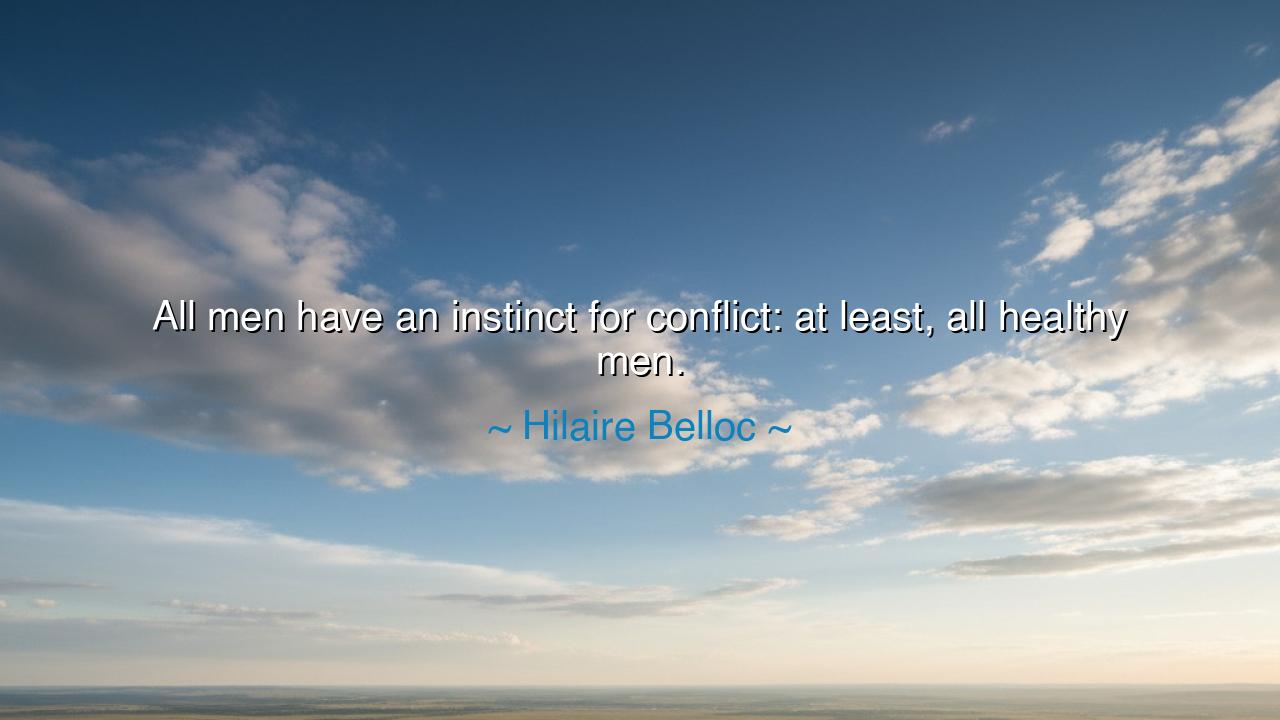
All men have an instinct for conflict: at least, all healthy men.






When Hilaire Belloc wrote, “All men have an instinct for conflict: at least, all healthy men,” he was not glorifying violence — he was speaking of something far deeper, older, and more essential: the innate struggle that gives meaning to human existence. His words echo through the corridors of history, reminding us that conflict is not merely found in the clash of swords, but in the eternal contest between comfort and courage, stagnation and growth, fear and faith. To live is to wrestle; to grow is to fight. Without conflict, the human spirit grows pale, like a flame denied its air.
In the days of the ancients, men and women alike were taught that conflict is the forge of the soul. The Spartans trained not because they loved battle, but because they understood that discipline and hardship preserved their freedom. Even the philosophers of peace, like Marcus Aurelius, recognized that every man carries a battlefield within — where reason and passion, virtue and weakness, endlessly contend. Belloc’s words, therefore, are not a hymn to war, but a salute to vitality — to the truth that only those who are alive in spirit feel the pull to resist, to conquer, to create. The instinct for conflict is the heartbeat of purpose itself.
To be “healthy,” as Belloc says, is not merely to possess a strong body, but to have a will that refuses to yield to despair. The man who feels no conflict, who never challenges injustice or strives beyond his ease, is not peaceful — he is empty. A lion that no longer hunts is not noble; it is dying. So it is with the soul that ceases to fight. The wise of old knew this. They called it agon, the sacred struggle. The athlete who runs, the artist who labors, the philosopher who debates, the hero who stands his ground — all partake in the same divine contest. They understand that conflict is the price of greatness, and that peace without purpose is only the stillness of decay.
Consider the life of Winston Churchill, who embodied this principle through the storms of war. In his youth, he was restless and reckless, a man born for challenge. When the world plunged into darkness, it was his spirit — fierce, unbroken, and instinctively drawn to struggle — that rallied a nation. “If you’re going through hell, keep going,” he once said, echoing Belloc’s truth in another form. It was not comfort or calm that preserved civilization in its darkest hour, but the instinct to fight, the refusal to bow before defeat. The healthy soul rises when tested; it finds identity through resistance.
Yet Belloc’s wisdom extends beyond the battlefield of nations into the quiet wars of everyday life. Each man and woman faces trials unseen by others — illness, doubt, failure, heartbreak. To shrink from them is to betray the instinct that nature and spirit alike have planted within us. To face them, however trembling, is to live in alignment with one’s design. The conflict within is sacred; it refines us as fire refines gold. Through each struggle, we are stripped of weakness and shaped into something enduring.
But let it be known: conflict alone is not virtue. The instinct for conflict must be guided by wisdom, lest it descend into cruelty or chaos. The ancients taught that true strength is not the power to destroy but the power to endure, to strive for justice and truth even when it demands pain. The healthy man, in Belloc’s meaning, is not the aggressor but the resister — one who stands against apathy, who fights for meaning, who refuses the numbness of indifference. His conflict is not with others alone, but with the baser forces within himself.
Therefore, the lesson is clear, O listener: do not flee from struggle. Welcome it as a teacher. When hardship rises, do not curse it; meet it with steady eyes. Seek out the noble conflicts — against ignorance, against cowardice, against the decay of your own will. For it is in such battles that the soul stays alive and the heart stays pure. The man who no longer fights has ceased to live; the one who embraces his conflicts becomes timeless.
So stand firm, children of tomorrow. Remember Belloc’s words, and carry them like a shield: the instinct for conflict is the mark of life itself. When you feel the weight of the world pressing against you, take courage — it means your spirit is still strong, your blood still sings, and your heart has not surrendered to silence.






AAdministratorAdministrator
Welcome, honored guests. Please leave a comment, we will respond soon